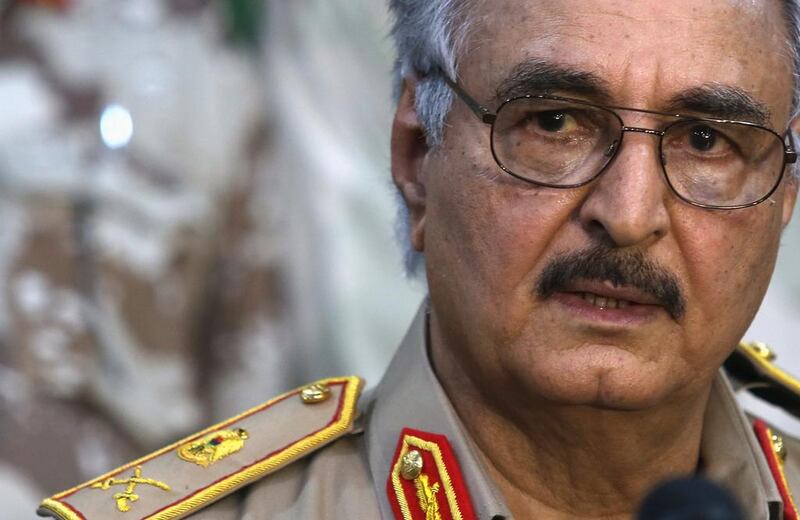A new peace initiative to end Libya’s bitter two-year civil war began this week, with neighbouring powers meeting in a process dominated by questions about the future of the country’s most powerful military chief.
Field Marshal Khalifa Haftar, who controls much of the country’s key oil production, enjoys growing public support. His Libyan National Army (LNA) is close to clearing the city of Benghazi of militias, cementing its dominance of eastern Libya.
After a two-day meeting by foreign ministers of Egypt, Algeria and Tunisia, it was announced that their respective presidents — Abdel Fattah El Sisi, Abdelaziz Bouteflika and Beji Caid Sebsi — will convene a high-level summit at a date yet to be set, to debate a Libya peace plan.
The diplomats declared, following their meeting in Tunis on Sunday and Monday, their “attachment to Libya’s sovereignty and territorial integrity”.
All three states are concerned about the overspill of Libya’s ruinous civil war: Egypt has seen Libyan weapons used by terrorists against security forces in Sinai, Algeria has had Libya-based terrorists attack its gasfields, while Tunisia has suffered attacks on tourist sites by ISIL fighters trained in Libya.
On the positive side, the three states demonstrated their ability to work together, issuing a common statement on Monday declaring opposition to outside military intervention in Libya.
On the negative side, Libya’s neighbours find themselves in the same situation as the United Nations Support Mission for Libya (UNSMIL) which has struggled to find a power-sharing formula acceptable to all Libyan factions.
The UN mission backs the Government of National Accord (GNA) in Tripoli, but its designated prime minister, Fayez Al Sarraj, has struggled to win support and is locked in conflict with a rival National Salvation Government, also in Tripoli.
In a city dominated by warring militias, a sombre reminder of the prime minister's precarious position came on Monday when his motorcade was raked by gunfire in the capital. Mr Al Sarraj was unhurt, but the attack underlined how little power the GNA has even in its own capital.
Both the GNA and the Salvation Government are meanwhile unrecognised by Libya’s third government, the elected House of Representatives parliament in the eastern city of Tobruk. Field Marshall Haftar is the parliament’s armed forces commander, and his forces have ensured the House of Representatives controls the so-called “oil crescent” — home to most of the country’s rich oil reserves.
With that trump card in its hand, the House of Representatives is well-positioned to set the terms for any new unity government.
Last year the parliament said it will not support the GNA unless Field Marshall Haftar becomes commander of all Libyan forces, but militias in Tripoli — collectively known as Libya Dawn — have refused to agree.
Last week, in search of compromise, Egypt invited both Field Marshall Haftar and Mr Al Sarraj for face-to-face talks in Cairo, but the Field Marshall rejected such a meeting.
Speaking to an Egyptian radio station over the weekend, Field Marshall Haftar said he intended to “liberate” Tripoli from groups he did not name, but branded as “terrorists”. It was an apparent statement that the war will continue, unless the militias surrender.
Launching an offensive on Tripoli would signal a major escalation in Libya’s civil war, bringing death and destruction to the streets of the capital.
Abroad, Field Marshall Haftar has won the support of Russia, which in January invited him for talks aboard an aircraft carrier, the Admiral Kuznetsov, offering military training and cooperation.
The United States has yet to state whether it will continue to support the GNA, as the Barack Obama administration did. But in recent weeks, America’s key allies have signalled willingness to embrace Field Marshall Haftar.
"We have been the first ones to say that Haftar should have a role," Italy's foreign minster Angelino Alfano said on February 7. The same day, Britain's foreign secretary Boris Johnson told the London Times: "That's the crucial question, how to make sure that Haftar is in some way integrated into the government of Libya."
France, meanwhile, admitted in July it had deployed elite operatives to work with Field Marshall Haftar’s forces to battle terrorists in Benghazi.
In other words, Field Marshall Haftar does not lack support. The problem for Egypt, Algeria and Tunisia — whose leaders are to convene in Tunis in the coming weeks — is how to encourage Libyans to find a peaceful means to accommodate the Field Marshall in their political structure.
foreign.desk@thenational.ae





